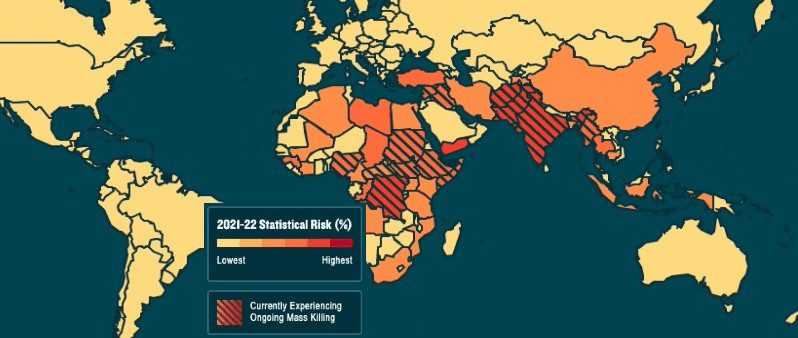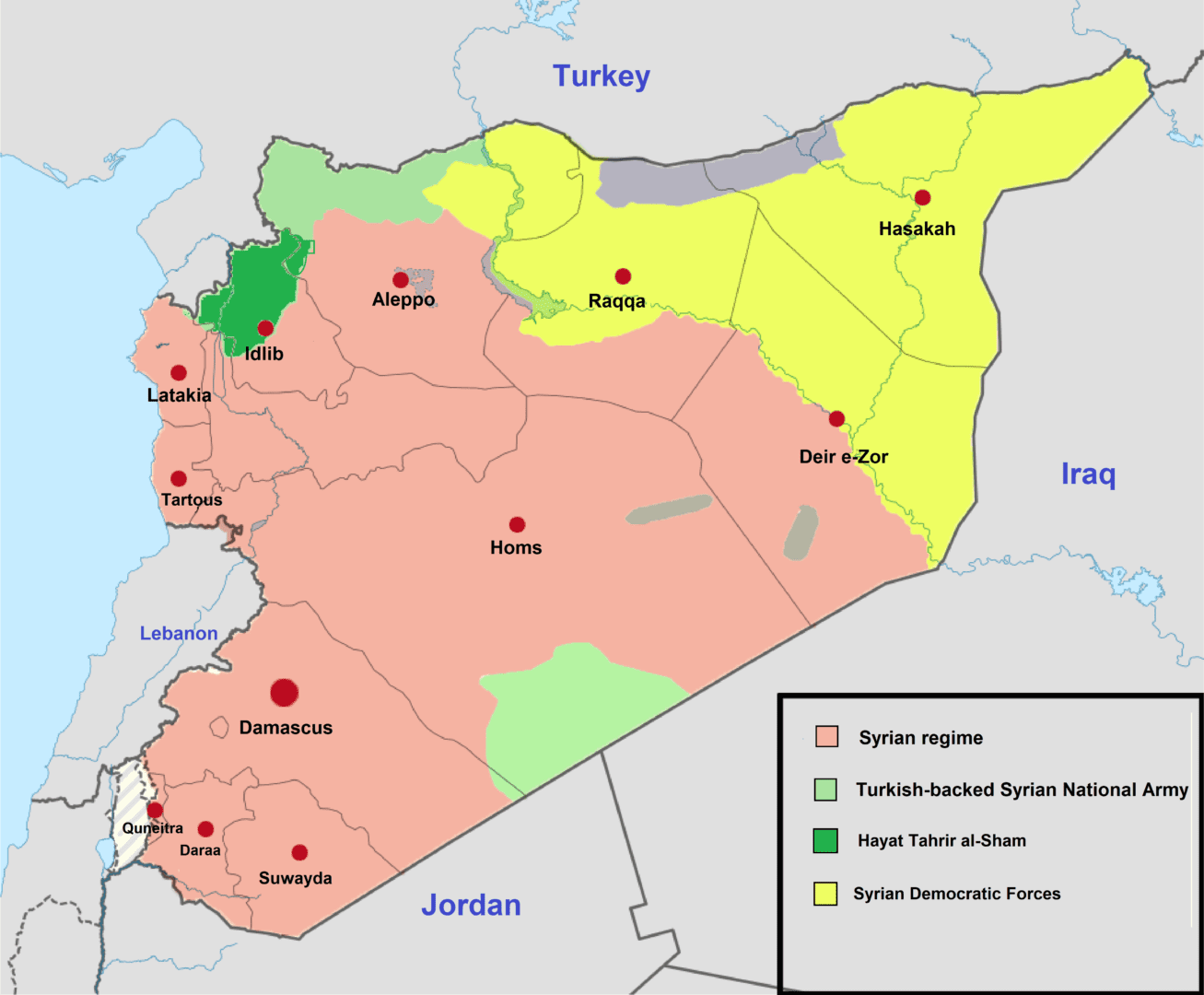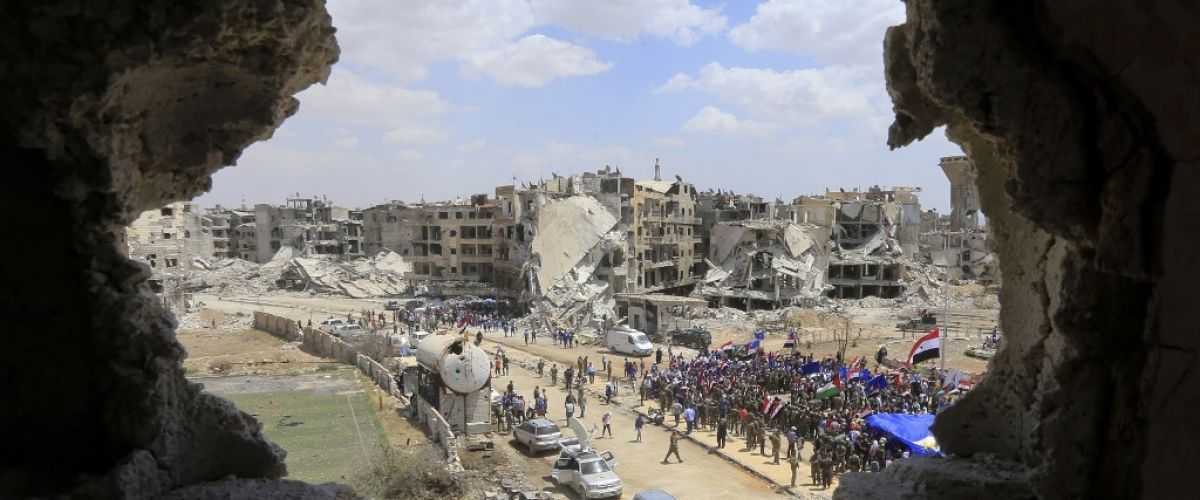Op-Ed: What could the new US Atrocity Prevention Strategy mean for Syria?
The first-ever US Strategy to Anticipate, Prevent and Respond to Atrocities could be a “significant advance” in protection efforts, but requires international collaboration and political will to be effective, writes Mansour Omari.
24 August 2022
On July 15, the United States Department of State released the 2022 US Strategy to Anticipate, Prevent and Respond to Atrocities. The document is the first of its kind in the country’s history, and could be a significant advance in efforts to prevent future atrocities. It could also respond to past and ongoing atrocities around the world, including in Syria, giving hope for human protection.
The strategy is based on the Elie Wiesel Genocide and Atrocities Prevention Act of 2018, which calls for the US to pursue a “government-wide strategy to identify, prevent and respond to the risk of atrocities.” The recently released strategy lays out this comprehensive government strategy in greater detail.
Unfortunately, there are several ongoing and anticipated atrocities worldwide. This means the “ambitious” strategy requires significant efforts, which the US is not capable of adequately undertaking on its own. The strategy should contain an international dimension, and its mandate should be expanded through discussions with partner countries, civil society, international organizations and companies, including major social media companies.
Countries such as Germany and Sweden that believe in the necessity and duty of protecting human beings should be partners. The US should work to include the strategy under the United Nations umbrella, by drafting it as a General Assembly resolution, provided it includes mandatory articles, not only voluntary ones.

Countries at Risk for Mass Killing 2021-2022: Early Warning Project, 29/11/2021 (US Holocaust Memorial Museum)
Under the new atrocity prevention strategy, the White House-led “Atrocity Prevention Task Force” could identify Syria as a top-priority country at risk of atrocities in all its phases: prevention, response and recovery.
Syria is not a single, sovereign state. There are four de facto “Syrias,” each run by different governments, each with its own flag, national colors, slogans, centralized political system, government, army and economy.
Each zone of influence in Syria has its own laws, political stances, foreign relations, allies and supporters. Each has its own ideology and social contract, as well as a different composition of political, religious or ethnic groups in power. The possible motives, perpetrators and victims of atrocities are also unique to each. The risk factors that may lead to atrocities in these areas do not correspond to a “single state.”

A map of control in Syria (Syria Direct, based on data from Liveuamap)
Effective steps available to the US regarding Syria:
Pending the integration of the atrocity prevention strategy into US regional operations and policies, it can take initial steps that are consistent with the new strategy and existing laws and commitments, including:
- The crisis of detainees, missing persons and torture in Syria
Detention and torture, practiced with impunity by the Syrian regime for decades, is one of the main reasons the Syrian revolution broke out. From the first days, demonstrators chanted demands and held signs calling for the regime to “release the detainees.” This call has been made by the popular movement, armed actors, civil society organizations and the families of the victims from spring 2011 until today.
Those who participated in the first demonstration in front of the Ministry of Interior in Damascus, on March 16, 2011, demanded the release of political detainees. The spark of revolution in Daraa ignited from popular unrest following the arrest of schoolchildren.
Assad met Syrians’ demands with further arrests, and the international community has not yet appreciated the impact of arbitrary detention and torture on Syrian society, its role in Syrians’ displacement in countries of asylum, or its impact on the prospect of peace and any future transitional justice process. The international community has not taken any serious steps to put an end to these crimes, which continue unabated to this day.
On the surface, the pace of the war in Syria has calmed. But the crisis of detainees in the darkness of Assad’s prisons—a fundamental cause of the war—continues.
The US fully understands the gravity of arbitrary detention and its impact on victims, their families and society as a whole. There are detained and disappeared Americans all around the world. Every new US administration, upon arriving in the White House, immediately works to recover kidnapped and detained American citizens.
The new strategy aims to expand interest in protecting people from mass atrocities using tools such as strategic communication and international diplomacy, as well as prioritizing data collection and information sharing about ongoing atrocities.
The US should take effective steps to address the largest ongoing crisis of arbitrary detention and enforced disappearance in this century—including in areas controlled by the opposition and US-backed Syrian Democratic Forces (SDF). In Syria, tens of thousands of detainees are held by the Syrian regime in the worst conditions of detention and torture, deprived of living among their family members.
The fates of thousands kidnapped by the Islamic State (IS) also remain unknown. The US should support the formation of an independent special investigative committee with a clear, defined task: to question all members of IS held in SDF prisons. This may lead to information about IS prisons, kidnappings and mass graves during the period of its control.
The average Syrian household has five family members. This means there are hundreds of thousands of relatives of detainees and disappeared people who are lost in a vortex of political talks, adrift in a long, torturous wait to learn the fate of their loved ones. They languish in uncertainty regarding crucial legal life affairs, including the disposition of property, inheritance and divorce. Hundreds of thousands of victims, detainees and their families deserve to live, and deserve effective measures to end their suffering.
- Move from negative neutrality to positive action
The strategy report includes diplomacy as one tool for preventing and responding to atrocities: “US diplomatic advocacy can influence the motivation and means of atrocity perpetrators by increasing the visibility and costs of atrocities.”
Increasing the cost of committing atrocities is essential to deterring them in the future. Isolating the Assad regime and preventing its rehabilitation as punishment for committing atrocities falls within this framework. The US should work to prevent Assad’s rehabilitation, not just make public statements that it does not support it. This negative neutrality on the part of the US—the most powerful country in the world—allows the perpetrators to reenter the international community at no cost. This encourages other states and individuals to commit atrocities, on the basis that they can do so then continue normally in their roles and lives.
Preventing Assad’s rehabilitation can be done at a number of levels. The US Department of State should intensify efforts to convince other countries not to restore relations with the Assad regime. For example, Algeria insists that the Syrian regime attend the upcoming Arab League Summit on November 1 in Algiers. According to the atrocity prevention strategy, the US should work with its partners in the Arab region to prevent the Assad regime from participating, even if it requires Arab states against normalization and future atrocities to boycott the summit.
- Consider foreign assistance and foreign programs strategy
The US should pay special attention to supporting professional, objective journalism and the media sources that produce it, as well as sound scholarly and academic research on reconciliation, transitional justice and related fields.
Support for academic research and independent, highly professional journalism should be included as an essential step to paving the way for atrocity prevention and response, including mechanisms for transitional justice, peace and community reconciliation.
The US should also support international and Syrian justice and accountability mechanisms and organizations, through coordinated law enforcement operations and information exchanges for investigations. It should also support the prosecution of individuals and entities for federal crimes, including torture and genocide.
- Review US national legislation to prosecute torture committed anywhere in the world
Referring to interagency roles, the strategy lays out that the Department of Justice should “support justice and accountability measures.” The Department of Justice could work to amend the legal restriction on universal jurisdiction in the US, in order to allow victims of the Assad regime and other perpetrators to seek justice in US federal courts.
In the case of Kiobel v. Royal Dutch Petroleum (2013), which was filed by Nigerian citizens claiming that the oil company aided and incited the Nigerian government in the 1990s to commit violations of customary international law, the US Supreme Court ruled that the Alien Tort Law does not apply outside US borders. The same ruling, however, held that US federal courts have jurisdiction to consider violations of international law that “touch and concern the territory of the United States.”
President Joe Biden stresses that preventing atrocities and promoting respect for human rights are fundamental to US national security. He has also said that atrocities threaten the security and interests of the US and partner countries. The Elie Wiesel Act also states that atrocity prevention is in the US national interest.
Two weeks after the US prevention strategy was released, Alice Edwards, the new UN Special Rapporteur on Torture, urged countries around the world to include the prosecution of torture in their national laws. Legislators around the world, including in the US, should review their national legislation to ensure that the crime of torture—whether committed in their country or anywhere else—can be prosecuted, including under universal jurisdiction.
- Review the Lebanon gas deal and support the Lebanese people in other ways
Today, more than ever, the US must review its efforts to bring about a gas pipeline deal passing from Egypt to Lebanon via Syria because of the significant financial, political and security gains such a deal would generate for the Assad regime. All of us are watching and being impacted by Russian President Vladimir Putin’s use of gas as an effective and influential tool for political pressure. The US should not provide such leverage to the Assad regime, the puppet of Putin and Iran.
The gas pipeline is as important as it is dangerous for Lebanon, a country that was occupied by the Assad regime, and where it spread corruption for decades. The pipeline will become a means of political and economic pressure and extortion in the Assad regime’s hands. It will be a return ticket to the country he dominated for decades before being forced to withdraw militarily in 2005. The two prongs of the pincers—Assad and Hezbollah—will rule the Lebanese people. Lebanon should look for other options. Otherwise, it will be like one who “invites the fox into his henhouse.”
The problem with the gas deal is not only that it threatens Lebanon’s security and supports the Assad regime. The deal, sponsored by the US ambassador to Lebanon, would normalize Assad’s atrocities and violate the atrocity prevention strategy and several US laws.
This deal, led by US Ambassador to Lebanon Dorothy Shea, has produced the largest campaign to normalize relations with the Assad regime, leading to an unprecedented diplomatic rehabilitation of major war criminals. This includes the first visit by the Syrian Defense Minister, the top war criminal of the Syrian regime, to Jordan. It has also seen, in 2021, the first official visit of its kind by a delegation of Lebanese ministers to Syria and ministerial meetings between Syria and Egypt.
This deal is tantamount to a mass rehabilitation festival on top of the bodies of the victims of Assad and the suffering of their families. Ambassador Shea’s efforts are unprecedented in their impact and danger, as they give Assad economic, political and security leverage, as well as long-term participation and empowerment in Lebanon, Jordan, Egypt and Israel.
Recently, the US Department of State welcomed this. Spokesman Ned Price wrote on Twitter that “we look forward to working with the World Bank” to finance the deal.
The Department of State, including Ambassador Shea, should be aware of the devastating effects of normalizing relations with the Assad regime, which encourages other regimes to commit atrocities and contravenes the laws and strategies of US national security. President Biden has said that atrocities threaten the security interests of the US and its partners. Executive Order 13729 of 2016 states that “preventing mass atrocities and genocide is a core national security interest and a core moral responsibility of the United States.”
The Department of State should reassess the significant impact of this deal in normalizing atrocities from the perspective of the new strategy, not look for legal theory to legitimize it, which weakens the Caesar Act and the Elie Wiesel Act, and blatantly contradicts the new strategy.
- Ensure civilian protection in opposition-controlled areas
If the regime attempts to take control of the remaining areas under opposition control, Assad and Putin will commit large-scale massacres during the fighting, as we saw in previous military operations. After taking control, Assad’s forces “purge” the area of any political opposition, free media, media activists, medics and anyone suspected of not supporting Assad.
Under the new strategy, the US can and should take effective steps to ensure civilian safety from potential atrocities by Assad and Putin during attempts to take control of these areas, and afterwards, if they succeed.
Multiple tools are available to policymakers seeking to prevent, limit or respond to atrocities. The Simon Scott Center for the Prevention of Genocide, part of the Holocaust Memorial Museum in Washington, DC, works to inform and motiviate policymakers around the world to prevent and stop genocide and related crimes against humanity, as well as to promote justice and accountability.
The center investigates a range of tools that could be used to prevent atrocities, and categorizes them into diplomatic, informational, military, economic and legal tools. It presents its findings on how policymakers can take effective measures to prevent atrocities and protect civilian populations in situations in which they face serious threats of mass and systematic violence.
The tools include: arms embargoes, comprehensive economic sanctions, development assistance, diplomatic sanctions, mediation, naming and shaming, peace operations, prosecutions, security assistance, documentation and fact-finding, military intervention, military presence, refugee protection and others.
In addition to these tools, working to create a community culture in opposition to atrocities in Syria is necessary to prevent future atrocities. These efforts include reviewing educational curricula and educating members and employees of legislative, judicial and executive authorities. They also include academic research, media, social media and specialized civil society organizations, among others.
The US can move its comprehensive atrocity prevention strategy from paper to reality, provided there is real political will and collaboration with international partners and concerned communities, including victim and vulnerable communities.
This article was originally published in Arabic and translated into English by Mateo Nelson.







